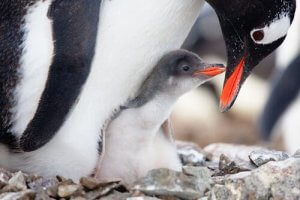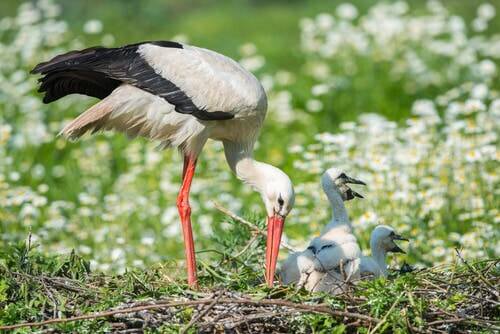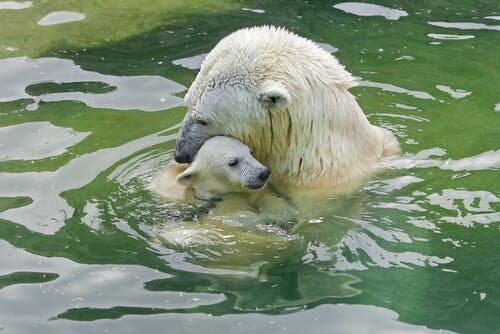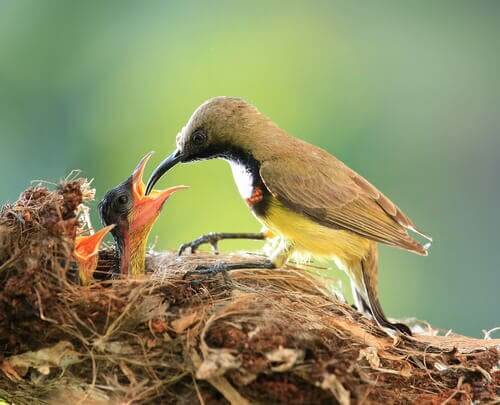Parental Care: Is it Worth the Effort?


Written and verified by the biologist Samuel Sanchez
Birds building nests in trees and hunting for food for their young… These are typical images in springtime. These may seem like adorable behavior, but behind them hides a complex evolutionary mechanism that’s full of nuances. Parental care involves parents exerting a massive amount of energy. What’s more, it can even drastically reduce their survival.
In nature, every effort is based on a trade-off or exchange. An invisible balance predetermines animal behavior, since everything is based on the need to make it to the next reproductive stage in order to produce more offspring.
So, what’s more beneficial for parents? Sacrificing their own health in order to care for their young? Or leaving them to fend for themselves, thus maximizing their own chances of surviving one more year?
Without a doubt, parental care in animals is an engrossing subject. So, stick around and read the following article to find out why.
Parents to the rescue

Parental care refers to any behavior in parents that increases the chances of survival of their young. Here are just a few examples:
- The preparation of nests or burrows
- Caring for young, both inside and outside of a parent’s body
- The provisioning and feeding of young after their birth
- Caring for the offspring’s nutrition until they achieve nutritional independence
Sounds simple enough, right? But an essential differentiation still exists within the term parental care:
- Parental care is the spending of resources by parents (including time and energy) in the care of one or more descendants. This is quantifiable, as it’s based on a proportion of resources.
- Parental investment is any action by parents to increase the survival of their young at the cost of some component of their own survival. For example, if a parent exposes itself to predators in order to find food for its young, its own chances of survival go down. At the same time, the chances of its young surviving increase. Without the help of their parents, baby animals may be unable to eat or have a much harder time doing so.

How great is the cost?
Studies on animal behavior have demonstrated that parental care can have a devastating effect on the parents. In the common housemartin (Delichon urbicum)–a type of sparrow–researchers noted that the survival of females decreased if they had two broods of offspring per year.
It’s not only the laying of eggs that puts a strain on birds. They must also incubate their eggs and feed their young until they become independent. All of this work weakens the mother and, as a result, her reflexes may decrease when it comes to opportunistic predators.
Another study demonstrated that, in the willow tit (Poecile montanus), the number of offspring born negatively impacts the parents’ chances of survival. The more babies the birds have, the more mouths they must feed. And, therefore, the less time they can devote to feeding themselves.
A numerical dance
Reproduction in the animal world sounds a bit dangerous, doesn’t it? Fortunately, mathematics determines the most primal behavior.
Optimal parental investment of offspring is that which maximizes the survival of each descendant with a minimal cost to parents. In other words, benefit-cost=a positive number. Two challenges that parents must face are:
- How much to invest in each child: More young and less investment per descendant or less young and more investment per descendant.
- How much to invest in present reproduction vs. future reproduction.
All of this may sound complicated, but, in reality, there are mathematical functions that explain this exchange between parents and their young. Ultimately, the effort is quantifiable. For example, the energy measured in parents and the percentage of offspring that survive, for example.
The perfect number of offspring is that which puts the parents at least risk in regard to survival during the next breeding season.

Parental care: Animal altruism or pure self-benefit?
Saying that parents give their lives for their offspring unconditionally is a bit of a distortion of reality. After all, while it may be sad to see it in such a cold way, parents ultimately look for their own benefit.
In the wild, the motor behind life is spreading one’s own genetic information. In other words, producing offspring. Parental care isn’t as selfless as it seems. And that explains why there are so few species where adults care for the offspring of others.
Let’s take it a step further. In many species where fathers can’t be sure that offspring are theirs, males don’t take responsibility for their descendants. For example, in the case of the external fertilization of eggs.
As you’ve seen, the world of parental care is complex and based on a numbers game. It all comes down to transmitting the greatest amount of genetic materials and making sure that offspring can carry their lineage into the future.
Birds building nests in trees and hunting for food for their young… These are typical images in springtime. These may seem like adorable behavior, but behind them hides a complex evolutionary mechanism that’s full of nuances. Parental care involves parents exerting a massive amount of energy. What’s more, it can even drastically reduce their survival.
In nature, every effort is based on a trade-off or exchange. An invisible balance predetermines animal behavior, since everything is based on the need to make it to the next reproductive stage in order to produce more offspring.
So, what’s more beneficial for parents? Sacrificing their own health in order to care for their young? Or leaving them to fend for themselves, thus maximizing their own chances of surviving one more year?
Without a doubt, parental care in animals is an engrossing subject. So, stick around and read the following article to find out why.
Parents to the rescue

Parental care refers to any behavior in parents that increases the chances of survival of their young. Here are just a few examples:
- The preparation of nests or burrows
- Caring for young, both inside and outside of a parent’s body
- The provisioning and feeding of young after their birth
- Caring for the offspring’s nutrition until they achieve nutritional independence
Sounds simple enough, right? But an essential differentiation still exists within the term parental care:
- Parental care is the spending of resources by parents (including time and energy) in the care of one or more descendants. This is quantifiable, as it’s based on a proportion of resources.
- Parental investment is any action by parents to increase the survival of their young at the cost of some component of their own survival. For example, if a parent exposes itself to predators in order to find food for its young, its own chances of survival go down. At the same time, the chances of its young surviving increase. Without the help of their parents, baby animals may be unable to eat or have a much harder time doing so.

How great is the cost?
Studies on animal behavior have demonstrated that parental care can have a devastating effect on the parents. In the common housemartin (Delichon urbicum)–a type of sparrow–researchers noted that the survival of females decreased if they had two broods of offspring per year.
It’s not only the laying of eggs that puts a strain on birds. They must also incubate their eggs and feed their young until they become independent. All of this work weakens the mother and, as a result, her reflexes may decrease when it comes to opportunistic predators.
Another study demonstrated that, in the willow tit (Poecile montanus), the number of offspring born negatively impacts the parents’ chances of survival. The more babies the birds have, the more mouths they must feed. And, therefore, the less time they can devote to feeding themselves.
A numerical dance
Reproduction in the animal world sounds a bit dangerous, doesn’t it? Fortunately, mathematics determines the most primal behavior.
Optimal parental investment of offspring is that which maximizes the survival of each descendant with a minimal cost to parents. In other words, benefit-cost=a positive number. Two challenges that parents must face are:
- How much to invest in each child: More young and less investment per descendant or less young and more investment per descendant.
- How much to invest in present reproduction vs. future reproduction.
All of this may sound complicated, but, in reality, there are mathematical functions that explain this exchange between parents and their young. Ultimately, the effort is quantifiable. For example, the energy measured in parents and the percentage of offspring that survive, for example.
The perfect number of offspring is that which puts the parents at least risk in regard to survival during the next breeding season.

Parental care: Animal altruism or pure self-benefit?
Saying that parents give their lives for their offspring unconditionally is a bit of a distortion of reality. After all, while it may be sad to see it in such a cold way, parents ultimately look for their own benefit.
In the wild, the motor behind life is spreading one’s own genetic information. In other words, producing offspring. Parental care isn’t as selfless as it seems. And that explains why there are so few species where adults care for the offspring of others.
Let’s take it a step further. In many species where fathers can’t be sure that offspring are theirs, males don’t take responsibility for their descendants. For example, in the case of the external fertilization of eggs.
As you’ve seen, the world of parental care is complex and based on a numbers game. It all comes down to transmitting the greatest amount of genetic materials and making sure that offspring can carry their lineage into the future.
All cited sources were thoroughly reviewed by our team to ensure their quality, reliability, currency, and validity. The bibliography of this article was considered reliable and of academic or scientific accuracy.
- https://esajournals.onlinelibrary.wiley.com/doi/abs/10.1890/0012-9658(2001)082[2948:EOLHAE]2.0.CO;2
- https://www.jstor.org/stable/4185?seq=1
This text is provided for informational purposes only and does not replace consultation with a professional. If in doubt, consult your specialist.







